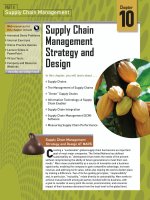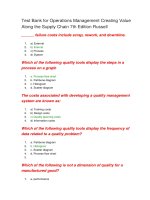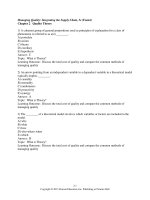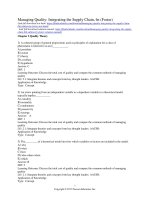Lecture Operations management: Creating value along the supply chain (Canadian edition) - Chapter 1S
Bạn đang xem bản rút gọn của tài liệu. Xem và tải ngay bản đầy đủ của tài liệu tại đây (696.96 KB, 25 trang )
OPERATIONS MANAGEMENT:
Creating Value Along the Supply Chain,
Canadian Edition
Robert S. Russell, Bernard W. Taylor III, Ignacio Castillo, Navneet Vidyarthi
CHAPTER 1 SUPPLEMENT
Decision Analysis
Supplement 1-1
Lecture Outline
Decision Analysis
Decision Making without Probabilities
Decision Analysis with Excel
Decision Analysis with OM Tools
Decision Making with Probabilities
Expected Value of Perfect Information
Sequential Decision Tree
Supplement 1-2
Decision Analysis
Quantitative methods
• a set of tools for operations manager
Decision analysis
• a set of quantitative decision-making techniques for
decision situations in which uncertainty exists
• Example of an uncertain situation
•
demand for a product may vary between 0 and 200 units,
depending on the state of market
Supplement 1-3
Decision Making Without Probabilities
States of nature
• Events that may occur in the future
• Examples of states of nature:
•
•
high or low demand for a product
good or bad economic conditions
Decision making under risk
• probabilities can be assigned to the occurrence of states of nature in
the future
Decision making under uncertainty
• probabilities can NOT be assigned to the occurrence of states of
nature in the future
Supplement 1-4
Payoff Table
Payoff table
• method for organizing and illustrating payoffs from
different decisions given various states of nature
Payoff
• outcome of a decision
Supplement 1-5
Decision Making Criteria Under
Uncertainty
Maximax
choose decision with the maximum of the maximum
payoffs
Maximin
choose decision with the maximum of the minimum
payoffs
Minimax regret
choose decision with the minimum of the maximum
regrets for each alternative
Supplement 1-6
Decision Making Criteria Under
Uncertainty
Hurwicz
choose decision in which decision payoffs are weighted
by a coefficient of optimism, alpha
coefficient of optimism is a measure of a decision
maker’s optimism, from 0 (completely pessimistic) to 1
(completely optimistic)
Equal likelihood (La Place)
choose decision in which each state of nature is weighted
equally
Supplement 1-7
Southern Textile Company
Supplement 1-8
Maximax Solution
Decision: Maintain status quo
Supplement 1-9
Maximin Solution
Decision: Expand
Supplement 1-10
Minimax Regret Solution
Decision: Expand
Supplement 1-11
Hurwicz Criteria
Decision: Expand
Supplement 1-12
Equal Likelihood Criteria
Decision: Expand
Supplement 1-13
Decision Analysis with Excel
Supplement 1-14
Decision Analysis with OM Tools
Supplement 1-15
Decision Making with Probabilities
Risk involves assigning
probabilities to states of nature
Expected value
• a weighted average of decision
outcomes in which each future state
of nature is assigned a probability of
occurrence
Supplement 1-16
Expected Value
EV (x) =
p(xi)xi
n
i =1
where
xi = outcome i
p(xi) = probability of outcome i
Supplement 1-17
Decision Making with Probabilities
Supplement 1-18
Decision Making with Probabilities: Excel
Supplement 1-19
Expected Value of Perfect Information
EVPI
maximum value of perfect information to the
decision maker
maximum amount that would be paid to gain
information that would result in a decision better
than the one made without perfect information
Supplement 1-20
EVPI
Good conditions will exist 70% of the time
choose maintain status quo with payoff of $1,300,000
Poor conditions will exist 30% of the time
choose expand with payoff of $500,000
Expected value given perfect information
= $1,300,000 (0.70) + 500,000 (0.30)
= $1,060,000
Recall that expected value without perfect
information was $865,000 (maintain status quo)
EVPI= $1,060,000 - 865,000 = $195,000
Supplement 1-21
Sequential Decision Trees
A graphical method for analyzing decision
situations that require a sequence of
decisions over time
Decision tree consists of
Square nodes - indicating decision points
Circles nodes - indicating states of nature
Arcs - connecting nodes
Supplement 1-22
Evaluations at Nodes
Compute EV at nodes 6 & 7
EV(node 6)= 0.80($3,000,000) +
0.20($700,000) = $2,540,000
EV(node 7)= 0.30($2,300,000) +
0.70($1,000,000)= $1,390,000
Decision at node 4 is between
$2,540,000 for Expand and
$450,000 for Sell land
Choose Expand
Repeat expected value calculations and
decisions at remaining nodes
Supplement 1-23
Decision Tree Analysis
Supplement 1-24
COPYRIGHT
Copyright © 2014 John Wiley & Sons Canada, Ltd.
All rights reserved. Reproduction or translation of
this work beyond that permitted by Access Copyright
(The Canadian Copyright Licensing Agency) is
unlawful. Requests for further information should be
addressed to the Permissions Department, John
Wiley & Sons Canada, Ltd. The purchaser may make
back-up copies for his or her own use only and not
for distribution or resale. The author and the
publisher assume no responsibility for errors,
omissions, or damages caused by the use of these
programs or from the use of the information
contained herein.









